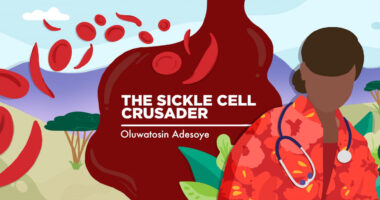My Support Network Has Sickle Cell, Too

Every day I make a thousand and one micro-decisions to manage my health with sickle cell disease and avoid having a vaso-occlusive crisis.
Most of these decisions are automatic, subconscious actions based on years of experience and learned behavior to prevent a crisis. For example, I’m always drinking water to avoid dehydration. I keep the temperature of my environment steady to reduce rapid blood vessel constriction. I conduct mental check-ins to help manage stress.
In my bubble, I can maintain these actions a lot easier than when I interact with the external environment. In fact, learning to live outside my bubble and engage in social activities comes with many challenges. Those challenges feel like my individual experience, but I was recently made aware that I’m not alone in them.
My support network has been essential to managing my condition. These supporters have had to learn to make similar decisions for my health, without my years of experience. Those in closest proximity to me essentially have sickle cell, too. They adapt their plans to accommodate me out of love and desire to see me well.
Before a crisis: adapting ideas so that plans include me
One of my friends is planning a birthday celebration for November, when it’s usually cold and miserable in the U.K. The original plan called for a giant playground-themed outdoor activity, but since the weather isn’t great in November, my friend opted for something indoors. I suddenly realized that the change was actually because they were thinking of how cold weather could trigger a crisis for me.
Initially, this change was difficult to accept because I felt like I was an inconvenience. But I learned that my friend wanted me to have fun without consequences. It would’ve been worse to continue as though I didn’t have sickle cell and potentially have a crisis for which my friend would feel guilty. It’s a balancing act between what I can and can’t do for my well-being.
During a crisis: pushing past tiredness and physical limitations
With my most recent crisis, I couldn’t sleep much or walk, so I had to be wheeled about in a wheelchair. I was tired and embarrassed that I couldn’t walk and was debilitated by the crisis. However, the physical and mental toll on others who looked after me in that state is one I can’t fully comprehend while dealing with my pain.
I can see the fatigue in those who care for me and feel guilt that it’s because of me. However, I’ve had to accept that it’s OK to be sick sometimes. The actions of my support network show they care about me. They don’t see me as a burden; they see the situation as burdensome.
After a crisis: prioritizing my own needs before theirs
Recovering from a crisis can take a heavy toll on my mental health. I often withdraw or lash out at those closest to me, who have to bear it. Yet my supporters also suffer from the psychological and physical exhaustion of looking after me. And there isn’t a space for them to prioritize their needs until I feel better.
In reflecting on this, I realized that I need more communication with my support network while I’m having my good days. I should check in with how they’re feeling about having sickle cell, too. What was the last crisis like for them? Is there anything we can improve during these different stages of a crisis?
I don’t want to feel guilty about the adjustments those closest to me make to accommodate me. However, having an open and honest discussion about their thoughts will help me transition to feel like a loved individual instead of a burden. Out of love, they’re happy to make these adjustments for me because they want me to have good days as often as possible.
For that, I am, and should always be, grateful.
Note: Sickle Cell Disease News is strictly a news and information website about the disease. It does not provide medical advice, diagnosis, or treatment. This content is not intended to be a substitute for professional medical advice, diagnosis, or treatment. Always seek the advice of your physician or other qualified health provider with any questions you may have regarding a medical condition. Never disregard professional medical advice or delay in seeking it because of something you have read on this website. The opinions expressed in this column are not those of Sickle Cell Disease News or its parent company, Bionews, and are intended to spark discussion about issues pertaining to sickle cell disease.








Anusjka Regis-Etumnu
Thanks for sharing. Yes, it is still difficult to engage with others who don't understand how to support us. Sometimes even those who are close and should be in the bubble can't be part of the bubble as they make no effort to support us in our experience.
Dunstan Nicol-Wilson
Hi Anusjka, thanks for your comment. Yes, it's hard when that happens! I try to tell those within my bubble how to help me. If they want to help me in the first place. I hope you have those who want to help around you; all the best with your journey!
meinerts Mendah
my very good friend is a sickler. her crisis is increasingly getting worse. I don't even know how to be there for her. any advice on how I can be there for her?
Dunstan Nicol-Wilson
Hi Meinerts, thanks for your comment. The most important thing is to be present and ask your friend how you can help. When she is feeling better might be the best time so you can ask what she needs going forward. I would also recommend researching sickle cell to know what essential things can help! There are a few posts on the site that has some good tips! Ultimately just make her aware that you are on hand to help!